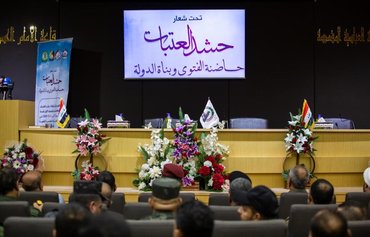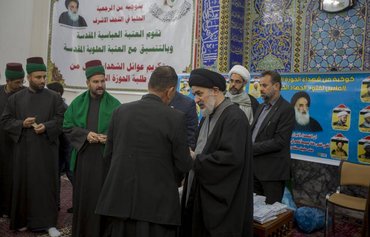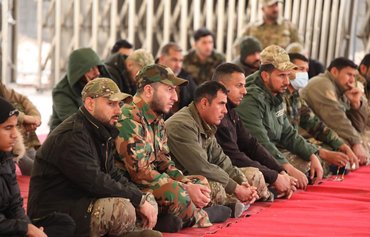Four paramilitary groups that had been operating under the auspices of the Popular Mobilisation Forces (PMF) on March 18th announced they were leaving the PMF and that their fighters would be absorbed into the Iraqi army.
Liwa Ansar al-Marja'iyya, Liwa Ali al-Akbar, al-Abbas Combat Division and Imam Ali Combat Division are aligned with Iraq's top Shia cleric, Ali al-Sistani.
Their decision to disband from the PMF is an indication that the religious institution in Najaf wants to "control and normalise the situation", said Issam al-Fayli who teaches political science at al-Mustansiriyah University.
The factions that emerged in response to al-Sistani's fatwa of June 2014, which called on Iraqis to confront the rapid expansion of the "Islamic State of Iraq and Syria" (ISIS), "now have to join the official military institution", he told Diyaruna.
![Members of the Iran-backed Saraya al-Khorasani militia take part in a military parade on August 25th, 2019. [Photo circulated online]](/cnmi_di/images/2020/04/02/23271-PMF-Militia-Iraq-600_384.jpg)
Members of the Iran-backed Saraya al-Khorasani militia take part in a military parade on August 25th, 2019. [Photo circulated online]
Armed forces "should be taking their orders from the Ministry of Defence and be subject to the rule of law of this institution and the guidance and laws issued by government authorities", al-Fayli said.
The Iran-backed militias took advantage of their participation in the war on ISIS to strengthen their influence and authority at the expense of the state, acting independently of it, he added.
Keeping arms in state hands
The factions' decision reflects a general trend towards "restricting weapons to the state", al-Fayli said, noting that their move to join the Iraqi army might "encourage other factions to take similar steps".
Although they had claimed to be part of the state system, armed groups with links to Iran have been known to openly reject government decisions.
Last August, for example, the PMF's 30th Brigade refused to relinquish its position in the Ninawa Plains area to the Iraqi army.
Iran-backed militias such as Kataib Hizbullah, Harakat al-Nujaba, Asaib Ahl al-Haq, Badr Brigades and Saraya al-Khorasani also are accused of violating the state's authority.
The militias are accused of suppressing Iraqi protestors who oppose their influence, Iran's dominance and their undermining of state sovereignty, as well as their continuous attacks on international coalition forces in Iraq.
"Al-Sistani's vision centres on building and strengthening state institutions and the rule of law, and ensuring Iraq does not turn into a score-settling arena," al-Fayli said.
"It is in our interest that all factions be integrated with the official state institutions, and that they prove their loyalty to the homeland," he said.
Necessary to restructure the PMF
"The issue of restructuring the PMF requires political accord, a national and independent will and a general evaluation of any action in this regard," al-Fayli said.
Former prime minister Adel Abdul Mahdi issued a decree last July to integrate PMF factions into the security forces, but this was never enforced, he noted.
The decision of the four Najaf-aligned factions to join the Iraqi army is "a reflection of efforts to isolate and undermine the influence of Iraqi militias whose loyalty lies with Iran", Iraqi strategy expert Alaa al-Nashou told Diyaruna.
This decision also indicates that "these factions do not wish to be part of the Iranian agenda, nor do they want to be responsible for activities that harm the security and sovereignty of Iraq perpetrated by Iran's Iraqi agents", he said.
Al-Nashou underscored the importance of disbanding the PMF, noting that this force lacks "power and professionalism" and that its emergence was purely a result of the state of emergency Iraq was facing with the ISIS incursion.
Now that ISIS has been defeated, "we have to work towards dissolving these factions and integrating their trained members into security institutions", he said.
This will curb Iranian influence and the behaviour of militias that bill themselves as a counterforce or even as a dominant force over the state, he said, in addition to reducing the militarisation of Iraqi society.
Steering away from Iran-aligned militias
Prior to the announcement, the leaders of the four factions held a meeting with Iraqi Minister of Defence Najah al-Shammari and other military officials to discuss the mechanism for integrating their members into the army.
Popular resentment of the behaviour of Iran-affiliated militias during the ongoing protests was a key factor behind the four factions' decision to pull out of the PMF, journalist Ziyad al-Sinjari told Diyaruna.
These factions want to distance themselves from the anger on the street towards Iran-affiliated militias, which are responsible for committing human rights violations and crimes and plundering the country's resources, he said.
Al-Sinjari noted that this move also comes at a time when the militias have escalated attacks on international coalition forces, saying it "sends a message to Iran's agents that they alone bear the responsibility of their behaviour".

![Iraqi military officials attend a March meeting with the leaders of four factions that pulled out of the Popular Mobilisation Forces to discuss absorbing members of those factions into the Iraqi army. [Photo courtesy of the Tactical Cell]](/cnmi_di/images/2020/04/02/23270-Iraq-Officials-Meeting-600_384.jpg)






